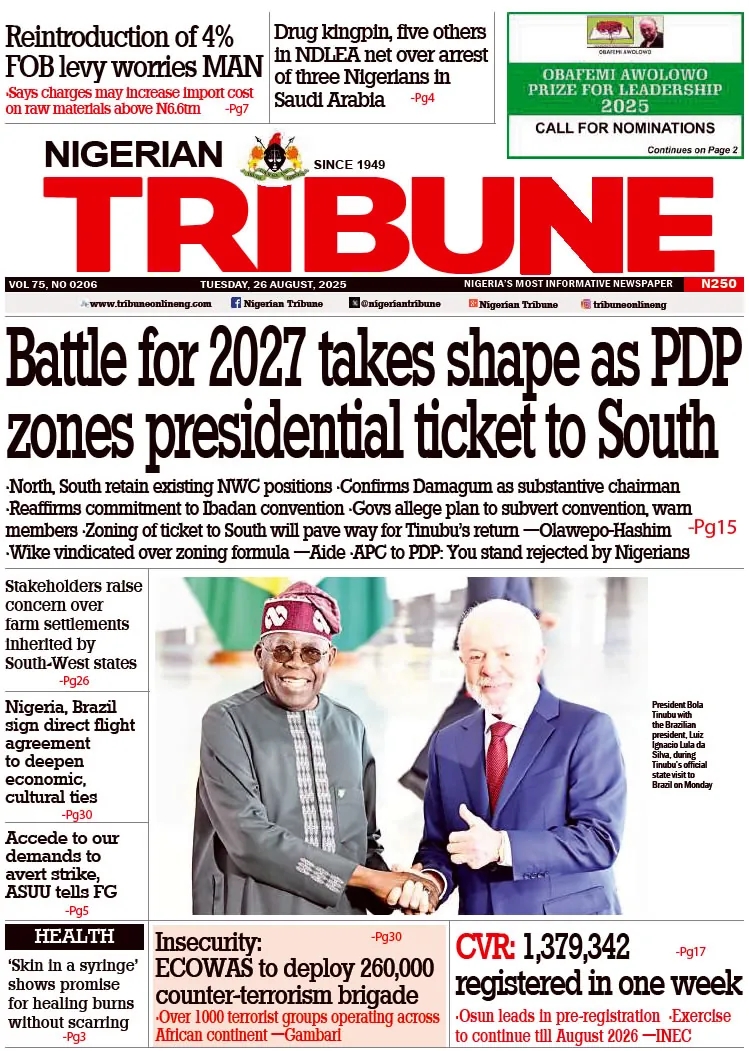WITH the plethora of challenges facing the Nigerian nation, the question should no longer be whether Nigeria should restructure its constitutional foundations, but when would it take positive and practical steps to do restructure? As a matter of fact, successive governments in Nigeria have at various times recognized the need to restructure Nigeria by setting up constitutional review conferences. For example, the National Political Reform Conference (NPRC) was established on 21 February 2005 by former President Olusegun Obasanjo with the clear mandate to: reassess, refocus, redefine and redesign our political landscape in a direction that would strengthen the bonds of unity, enhance the process of democratic consolidation, strengthen the structures so as to solidify those values that promote democracy, good governance and good neighbourliness; and open boundless opportunities for all Nigerians to be and to feel that they are part of the evolving political process and socio-economic advancement.
Prior to the NPRC, there were pre-independence conferences that led to Independence on 1 October 1960, as well as post-independence Conferences such as the pre-1979 Constitutional Conference that ushered in the 1979 Constitution, the Constitutional Conference under General Ibrahim Babangida, the Constitutional Conference organized by General Sani Abacha in 1994/5 and the conference convened by General Abdulsalami Abubakar that gave rise to the 1999 Constitution. Similarly, in 2014, former president Dr. Goodluck Ebele Jonathan inaugurated a National Conference made up of about 492 delegates from the different geopolitical zones, as well as from professional bodies group. The Conference was headed by retired Chief Justice Idris Legbo Kutigi. After months of deliberations, and significant expenditure, the conference passed more than 600 resolutions and produced a 10,335-page report which was submitted to President Goodluck Jonathan in late 2014. However, the report of the Conference was never implemented by President Jonathan as he lost reelection barely a few months later, neither did the successor government give life to the report.
It is evident from these attempts that we all know what is required to move Nigeria forward, but the political will, consistency and commitment to see process through has been fundamentally lacking. It is also clear that every new day is a day late, when it comes to the task of restructuring Nigeria. The earlier we restructure the country to revert to true federalism, the sooner we can begin to witness social cohesion, growth and economic recovery.
True federalism can provide a robust framework for meeting the demands of the multi-ethnic, multi-religious, multilingual, highly populated and geographically huge state that Nigeria is. With each passing government and era, the task of restructuring becomes more difficult, while the political will to do so becomes less apparent. Despite many constitutional conferences convened in the past to address the lapses in Nigeria’s constitutional foundation, there has never been a concrete and conclusive achievement in terms of advancing the tenets of federalism in the country. There is hardly any doubt from any well-meaning Nigerian that restructuring is long overdue. The key question is how do we go about achieving it?
The ruling elite in Nigeria have often conflated and equated calls for restructuring with a push for secession and dissolution of Nigeria as a nation. This has not allowed for a rich and focused discussion on the important task of addressing the constitutional and political defects in Nigeria’s federalist claims. The complex and urgent task at hand is clear, but the search for transformational leaders who can carry out the restructuring agenda remains elusive. Many of Nigeria’s current rulers are beneficiaries of the confusion, underdevelopment, ethno-religious conflicts and subjugation of the rule of law that characterize the status quo.It is therefore not surprising that rather than acknowledge and commit to a process of genuine restructuring, activists and leaders that preach the restructuring gospel are either castigated as saboteurs, or persecuted by agents of state. Nigeria is a hostage situation in which we know what to do to fix the many problems of the country, but the ruling class either lack the courage or political will to carry though those reforms. Successive governments have failed to see through a comprehensive and meaningful restructuring process, leaving the country to continue in its current state of chaos and retrogression.
How have other countries been able to undertake restructuring at different phases of their nationhood and how can Nigeria learn from the successful best practices? There are generally three main options for undertaking a restructuring process.
Plebiscite or referendum:
The Oxford Dictionary defines a plebiscite as a ‘direct vote of all the members of an electorate on an important public question such as a change in the constitution.’ In the life of many nations of the world, when there is a question of constitutional significance, an electoral process is often launched to obtain the direct vote of the people. A recent example is the United Kingdom European Union membership referendum (also known as the Brexit referendum) which took place in the United Kingdom on 23 June 2016. The nationwide referendum asked the UK people to vote on the question “Should the United Kingdom remain a member of the European Union or leave the European Union?” Prior to the process, the government had promised to implement whatever the result was even though it was not legally bound to do so. At the end of the voting, 51.9 per cent of the UK people voted in favour of leaving the EU. In fulfilment of its promise, the UK government initiated the official EU withdrawal process.
The UK example shows how advanced democracies can resolve complex constitutional questions through a national vote. One could for example, suggest that a national vote on one or more of the key challenges facing the country should be held with utmost priority to allow the Nigerian people have their say. For example, the question whether a Sovereign National Conference should be convened in Nigerian to address common issues of nationhood; whether Nigeria should be immediate restructured by abandoning or replacing the 1999 Constitution; whether there should be state police; or whether Nigeria should abandon the presidential system of government for a parliamentary one, amongst others. These are all important constitutional questions that can help Nigeria figure out a better path for the future. Generally, as demonstrated from the UK example, governments are not often legally bound to implement the result of a referendum. However, given the cost of conducting one, they do so with a firm promise to implement whatever the result is. The populace also trusts in the ability of the government to conduct a free, fair and credible referendum, not to annul the process in case of unfavourable outcome to them, and to implement the end result of the process as reflected in the final result.
The key question is:Do we have a crop of leaders and system in place to conduct and implement a free, fair and credible referendum to usher in a constitutional restructuring process? First, will governments at all levels support a referendum for important constitutional questions of the day? Secondly do we have a credible electoral process in place to conduct a fair and transparent referendum in Nigeria? and thirdly even if we conduct a referendum, will the leaders on all sides respect and implement the end result of the process? It is difficult to answer any of these questions affirmatively. The current winner takes it all system that we operate in Nigeria has created perverse incentives for rulers to suppress the will of the Nigerian people. It may therefore be a mere wishful thinking in Nigeria of today to expect a free, fair and credible referendum process to be conducted. To be continued…
AARE AFE BABALOLA, OFR, CON, SAN, LL.D (Lond.)
WATCH TOP VIDEOS FROM NIGERIAN TRIBUNE TV
- Let’s Talk About SELF-AWARENESS
- Is Your Confidence Mistaken for Pride? Let’s talk about it
- Is Etiquette About Perfection…Or Just Not Being Rude?
- Top Psychologist Reveal 3 Signs You’re Struggling With Imposter Syndrome
- Do You Pick Up Work-Related Calls at Midnight or Never? Let’s Talk About Boundaries







